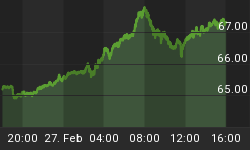Well, just like that, Ireland's ruling coalition sinks beneath the waves. After having promised that the country had enough funds to make it through until mid-summer 2011 (if you ignore the needs of the banking system, which apparently investors were not willing to do), and then folding and asking for help, the Prime Minister (Brian Cowen) announced today that the country will hold new elections after passage of the new budget in early 2011. Cowen faced defections from relatively minor (but crucial) coalition parties after seeking aid less than two weeks after claiming Ireland didn't need any money. The amount of money it now appears they do need, according to Goldman Sachs as cited in this Bloomberg story, is a mere $130 bln (€95bln). That's a lot of soda bread...and it happens to be something like 60% of Irish GDP. So Mr. Cowen was a wee bit off. It isn't a 'done deal,' either, since Germany intends to attach pretty stringent measures to the bailout and other EU countries (those who haven't failed and don't plan to) will also have a voice.
While Irish bond yields actually declined a few basis points today, since the aid package is presumed to be aimed at eviscerating the bond and equity holders of the banks (which ought to be interesting, since many of them are other banks elsewhere in Europe), Greek 10y bonds sold off 33bps. Spain and Portuguese rates were roughly unchanged, which is encouraging if you're hoping to arrest contagion before it gets started...but I wouldn't think we're done with this test yet.
U.S. and Continental equities were smacked, although U.S. markets managed to rally back to nearly unchanged on the day. But the FTSE was off 1.9%, the Spanish IBEX fell 2.7%, and the French bourse -1.1%. U.S. 10y real yields ended at 0.65% and 10y nominal rates at 2.81%, both improved on the day. The reactions are still surprisingly tepid, and the VIX today actually fell back to near recent lows. Some of that is due to a calendar that is rotten with holidays, but one certainly gets the impression that investors don't get it. Ireland was never supposed to happen. Greece was supposed to be the last domino. Does that worry anyone?
.
Looking back at last week, it seems odd to me that the markets responded positively to any rumor of an Irish bailout, while reacting negatively to news that China was tightening lending. For the record, during the last 12 months the United States has $275bln in exports to Europe and only $85.5bln with China (Source: US Census, e.g. here), so in terms of our domestic growth Europe is about three times as important as is China. True, imports of $370bln from Europe are only somewhat higher than the $348bln from China, but if China contracts 5% and Europe contracts 5%, the latter is a much bigger deal. Not only that, our banking system is much more intertwined with the European banking system than with the Chinese banking system.
Now, the fact that China is tightening is also a problem, but it is certainly less immediate. The problem there is that tighter monetary policy in China, coupled with looser monetary policy in the U.S., should make the yuan much stronger relative to the dollar. This is what we want, but China doesn't. A stronger yuan would slow the Chinese economy (which they seem to want), lower inflation (which they seem to want), but it would seem to be a concession to the West (which they don't seem to want). The Chinese government seems reticent to let the yuan accelerate its appreciation, but if it tightens policy and does not loosen the reins on the FX market, the pressure will build for a future less-gentle adjustment. I just don't think that's something we need to worry about in the next few months, while the collapse of the EU periphery on the other hand is something we need to worry about. And, as odd as it sounds, it doesn't seem to me as if anyone is worried about it.
.
Tomorrow's main event is the release of the FOMC minutes from the November 2-3 meeting. While just about every Fed official has spoken either in the days leading up to the meeting or in the days immediately following the meeting, so that it seems unlikely the minutes hold anything we are not already aware of, the market will lean on the nuance of the discussion (or what it perceives to be the nuance). Was it a close call, or is there pressure for a bigger or longer-lasting program? Among the unsurprising things we could learn that the market might still react to would be some admission that QE2 is progressing about as rapidly as the Fed can operationally handle; this could be read - depending how it is phrased - as a recognition that the current state of monetary policy is "we're pedaling as fast as we can" and that quantitative easing over a longer time horizon is entirely possible. This would be presumably good for TIPS and commodities and perhaps good for equities (although by now investors may realize that QE is not a license to buy stocks without risk).
The earlier data releases are less exciting. There will be a revision of Q3 GDP, and Existing Home Sales (Consensus: 4.48mm from 4.53mm) will also be released. Pay attention, as usual, to the inventory of existing homes, last at 3.38mm. A significant decline in inventory is a sine qua non for a recovery in broad pricing pressures and likely also crucial to broad economic activity as well. Finally, the Fed will buy TIPS while the Treasury sells 5y notes. I will say this much for the government, at least they avoid having the Fed buy exactly what the Treasury is selling...perhaps that will confuse some people.















